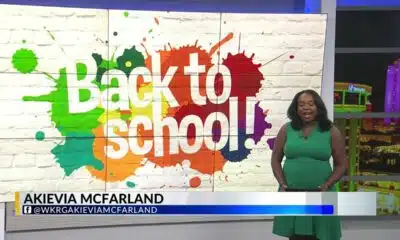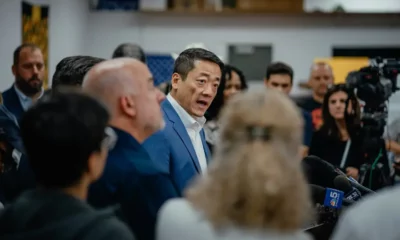News from the South - North Carolina News Feed
NC Senate budget eliminates hundreds of vacant jobs and some filled positions
SUMMARY: The North Carolina Senate’s budget proposal, presented by Majority Leader Michael Lee, outlines significant cuts, including 850 vacant state jobs, leaving over 14,000 positions unfilled. The $32.6 billion plan is slated for approval, while the House prepares its own budget. Critics, like Sen. Val Applewhite, question the lack of assessments for job necessity before cuts. The proposal also eliminates the Office of Historically Underutilized Businesses and the North Carolina Innocence Inquiry Commission, drawing concern from some senators. Additionally, it seeks to modernize the DMV and remove the “certificate of need” requirement for healthcare facilities.
The post NC Senate budget eliminates hundreds of vacant jobs and some filled positions appeared first on ncnewsline.com
News from the South - North Carolina News Feed
Body of missing NC teen found in Florida, family says
SUMMARY: The body of missing North Carolina teen Gio Gio was found in Bradenton, Florida, confirmed by his family. Originally, Gio Gio was supposed to be picked up by relatives after meeting cousins in Florida, but he disappeared after texting his mother for help. His family’s private investigators, not the police, discovered his body near I-75 after police had initially searched the area. Gio Gio’s mother expressed her heartbreak on Facebook, calling it every parent’s worst nightmare. The investigation continues, focusing on the timeline after Gio Gio entered the car with his cousins. An autopsy is pending, with no immediate signs of foul play.
The body of Giovanni Pelletier was found in a retention pond, authorities said, and his mom is living “every parent’s worst nightmare.”
https://abc11.com/post/giovanni-pelletier-body-missing-18-year-old-north-carolina-found-pond-where-last-seen-family-says/17483056/
Download: https://abc11.com/apps/
Like us on Facebook: https://www.facebook.com/ABC11/
Instagram: https://www.instagram.com/abc11_wtvd/
Threads: https://www.threads.net/@abc11_wtvd
TIKTOK: https://www.tiktok.com/@abc11_eyewitnessnews
X: https://x.com/ABC11_WTVD
News from the South - North Carolina News Feed
‘Highballed’: Data shows tax assessment inequalities affecting longtime homeowners
SUMMARY: Longtime homeowners in historically Black neighborhoods like Hillsborough face disproportionate property tax burdens compared to wealthier, mostly white areas nearby. Beverly Walton, a 66-year resident of Renshaw Street, inherited her home but struggles to afford rising taxes despite no renovations. Her house, valued lower than newer homes, is taxed at a higher rate, leading to financial strain on fixed incomes. Data from Wake, Durham, and Orange counties reveal majority nonwhite neighborhoods pay about $9 more per $100,000 in home value, despite lower average home prices. Advocates call for fairer assessments to prevent pricing out longtime residents amid regional growth.
Data shows tax assessment inequalities affecting longtime homeowners
https://abc11.com/post/highballed-data-shows-tax-assessment-inequalities-affecting-longtime-homeowners/17473973/
Download: https://abc11.com/apps/
Like us on Facebook: https://www.facebook.com/ABC11/
Instagram: https://www.instagram.com/abc11_wtvd/
Threads: https://www.threads.net/@abc11_wtvd
TIKTOK: https://www.tiktok.com/@abc11_eyewitnessnews
News from the South - North Carolina News Feed
Two deaths, sinkholes, downed trees: The impacts of severe flooding in Triangle
SUMMARY: Severe flooding in the Triangle region has caused two deaths, sinkholes, and downed trees. In Nash County, 55-year-old Raymond Evans Jr. and 24-year-old Lahie Alustin died after their minivan was swept into a ravine. Evans heroically tried to save Alustin after police efforts failed. A memorial has grown at the site. In Apex, heavy rain caused a sinkhole on Olive Chapel Road, collapsing a section already slated for repairs. Town officials are working with the Department of Transportation to expedite repairs, possibly earlier than the initially expected November timeline. Residents face detours and ongoing disruptions.
WRAL is tracking the impact of severe flooding that occurred all through Wednesday. Rain will continue on-and-off on Thursday, and it could be heavy at times.
-
Mississippi Today7 days ago
After 30 years in prison, Mississippi woman dies from cancer she says was preventable
-
News from the South - Texas News Feed7 days ago
Texas redistricting: What to know about Dems’ quorum break
-
News from the South - North Carolina News Feed5 days ago
Two people unaccounted for in Spring Lake after flash flooding
-
Mississippi Today6 days ago
Brain drain: Mother understands her daughters’ decisions to leave Mississippi
-
News from the South - Oklahoma News Feed2 days ago
Former payroll director ordered to prison, must repay district nearly $500,000
-
News from the South - Tennessee News Feed4 days ago
Trump’s new tariffs take effect. Here’s how Tennesseans could be impacted
-
News from the South - Georgia News Feed7 days ago
29-year-old killed after driving off road in 'dangerous' section road | FOX 5 News
-
News from the South - Louisiana News Feed7 days ago
Plans for Northside library up for first vote – The Current









































